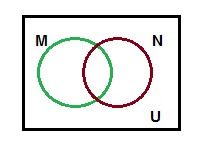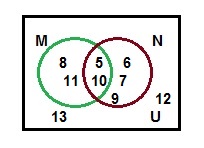UNION AND INTERSECTION PRACTICE PROBLEMS
Question 1 :
Place the elements of the following sets in the proper location on the given Venn diagram.

U = {5, 6, 7, 8, 9, 10, 11, 12, 13}
M = {5, 8, 10, 11}
N = {5, 6, 7, 9, 10}.
Solution :

Question 2 :
If A and B are two sets such that A has 50 elements, B has 65 elements and A∪B has 100 elements, how many elements in A∩B?
Solution :
Given n(A) = 50, n(B) = 65, n(A∪B) = 100
By the rule,
n(A∪B) = n(A) + n(B) - n(A∩B)
n(A∩B) = n(A) + n(B) - n(A∪B)
= 50+65-100
= 115-100
= 15
Question 3 :
If A and B are two sets containing 13 and 16 elements respectively, then find the minimum and maximum number of elements in A∪B?
Solution :
n(A) = 13 and n(B) = 16
n( A∪B) must be either the elements of the bigger set, that is B or the addition of number of elements in both A and B.
If A is the subset of B, then A∪B is the set B itself. Then the number of A∪B is number of B itself. That is the minimum number of A∪B.
So minimum of A∪B is 16.
If A and B are two disjoint sets, then number of elements in A∪B is the total number of elements in both A and B.
So, the maximum of A∪B is 13+16 = 29.
Question 4 :
If n( A∩B) = 5, n(A∪B) = 35, n(A) = 13, find n(B)?
Solution :
By the rule
n(A∪B) = n(A) + n(B) - n(A∩B)
n(B) = n(A∪B)+n(A∩B)-n(A)
= 35 + 5 - 13
n(B) = 27
Question 5 :
If n(A) = 26, n(B) = 10, n(A∪B) = 30, n(A') =17, find n(A∩B) and n(U)?
Solution :
n(A∪B) = n(A)+n(B)-n(A∩B)
n(A∩B) = n(A)+n(B)-n(A∪B)
n(A∩B) = 26+10-30
n(A∩B) = 6
n(A) + n(A') = n(U)
n(U) = 26+17
n(U) = 43
Question 6 :
If n(U) = 38, n(A) = 16, n(A∩B) = 12, n(B') = 20, find n(A∪B)?
Solution :
n(A) + n(A') = n(U)
n(B) = n(U)-n(B')
n(B) = 38 - 20
n(B) = 18
n(A∪B) = n(A)+n(B)- n(A∩B)
n(A∪B) = 16+18-12
n(A∪B) = 34-12
n(A∪B) = 22
Question 7 :
Let A and B be two finite sets such that n(A-B) = 30, n(A∪B) = 180, n(A∩B) = 60, find n(B)?
Solution :
n(A) = n(A-B) + n(AnB)
n(A) = 30+60
n(A) = 90
n(AuB) = n(A) + n(B) - n(AnB)
180 = 90 + n(B) - 60
180-30 = n(B)
n(B) = 150
Question 8 :
Of 50 cat and dog owners surveyed, 25 have a cat. Ten owners have a dog and a cat. How many owners have a dog?
Solution :
Let A and B be the people who are having cat and dog.
Number of people have cat and dog = n (AUB) = 50
Number of people having cat n(A) = 25
Number of people having dog n(B) = ?
Number of people who are having cat and dog
n(A n B) = 10
n(AUB) = n(A) + n(B) - n(A n B)
50 = 25 + n(B) - 10
50 = 15 + n(B)
50 - 15 = n(B)
n(B) = 35
Question 9 :
Of 240 college freshmen, 152 are taking history and 81 are taking science and history. How many freshmen are taking history but not science?
Solution :
Let A and B be the people who are taking history and science.
Number of people are taking history and science
n (AUB) = 240
Number of people who are taking history n(A) = 152
Number of people who are taking history and science
n(AnB) = 81
Number of people who are taking history but not science
= n(A) - n(AnB)
= 152 - 81
= 71
Question 10 :
Find two sets A and B such that
A U B = {1,2,3,4,5} and AnB = {2}.
Solution :
The set A may consist of elements including 2.
A = {1, 2}
The set B may consist of elements including 2.
B = {2, 3, 4, 5}
Question 11 :
Let M = {x | x is a multiple of 3} and N = {x | x is a multiple of 4}. Describe the intersection of M and N.
Solution :
Given that,
M = {x | x is a multiple of 3}
N = {x | x is a multiple of 4}
M = {3, 6, 9, 12, 15, 18, ...............}
N = {4, 8, 12, 16, 20, ..................}
To find the intersection of M and N, we should find the multiples of 12.
MnN = {12, 16, 20, 24, .............}
Question 12 :
Set X has 10 elements, set Y has 15 elements, and X n Y has 5 elements. How many elements are in X U Y?
Solution :
Number of elements in set X, n(X) = 10
Number of elements in set Y, n(Y) = 15
n(XnY) = 5
n(XUY) = n(X) + n(Y) - n(XnY)
= 10 + 15 - 5
= 25 - 5
n(XUY) = 20
Kindly mail your feedback to v4formath@gmail.com
We always appreciate your feedback.
©All rights reserved. onlinemath4all.com
Recent Articles
-
AP Calculus AB Problems with Solutions (Part - 6)
Jan 15, 25 07:19 PM
AP Calculus AB Problems with Solutions (Part - 6) -
Digital SAT Math Problems and Solutions (Part - 100)
Jan 14, 25 12:34 AM
Digital SAT Math Problems and Solutions (Part - 100) -
SAT Math Resources (Videos, Concepts, Worksheets and More)
Jan 14, 25 12:23 AM
SAT Math Resources (Videos, Concepts, Worksheets and More)